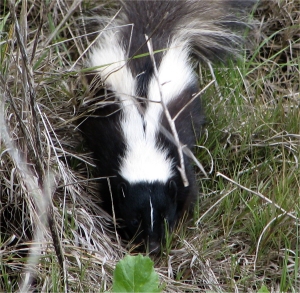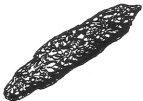Striped Skunk
throughout New Jersey and Staten Island, NY
 Striped Skunk |
The Striped Skunk is the type we have in New Jersey, it has a black body with a white stripe along each side of its body; the two stripes join into a broader white area at the nape. Its forehead has a narrow white stripe. About the size of a house cat, it weighs 2.5 to 14 pounds (1.2–6.3 kg) (Note that the average weight is 6-8 pounds (2.73kg-3.64 kg)) with a body length (excluding the tail) of 13 to 18 inches (33–46 cm). The bushy tail is 7 to 10 inches long (18–25 cm), and sometimes has a white tip.
Skunks are legendary for their powerful predator-deterrent—a hard-to-remove, horrible-smelling spray. A skunk's spray is an oily liquid produced by glands under its large tail. To employ this scent bomb, a skunk turns around and blasts its foe with a foul mist that can travel as far as ten feet (three meters).
Skunk spray causes no real damage to its victims, but it sure makes them uncomfortable. It can linger for many days and defy attempts to remove it. As a defensive technique, the spray is very effective. Predators typically give skunks a wide berth unless little other food is available.
There are many different kinds of skunks throughout the country. They vary in size (most are house cat-sized) and appear in a variety of striped, spotted, and swirled patterns—but all are a vivid black-and-white that makes them easily identifiable and may alert predators to their pungent potential.
 Skunk Tracks |
 Skunk Scat |
Skunks usually nest in burrows constructed by other animals, but they also live in hollow logs or even abandoned buildings. In colder climates, some skunks may sleep in these nests for several weeks of the chilliest season. Each female gives birth to between two and ten young each year.
Skunks are opportunistic eaters with a varied diet. They are nocturnal foragers who eat fruit and plants, insects, larvae, worms, eggs, reptiles, small mammals, and even fish. Nearly all skunks live in the Americas, except for the Asian stink badgers that have recently been added to the skunk family.
Nuisance Problems
The presence of a Striped Skunk is often first made apparent by its odor. It has well-developed anal scent glands (characteristic of all skunks) that can emit a highly unpleasant odor when the skunk feels threatened by another animal. The striped skunk may do a handstand while warning others.
The skunk is crepuscular (active during twilight). Beginning its search for food at dawn and dusk, it feeds on mice, eggs, carrion, insects, grubs, and berries. At sunrise, it retires to its den, which may be in a ground burrow, or beneath a building, boulder, or rock pile. While the male dens by itself, several females may live together. The Striped Skunk does not hibernate but instead goes into a dormant or semi-active state.
I was sprayed by a skunk, how do I get rid of the smell? Well here is a good formula that will help eliminate the skunk odor.
First, two notes of caution:
- The formula described below can cause blindness. Take sensible precautions to keep it away from the eyes. This may be tricky if the skunk sprayed the dog directly in the face. When in doubt, err on the side of caution; skunk stink will eventually wear off, but blindness might not.
- Do not store formula. Once the ingredients are mixed, a chemical reaction begins. If placed in a sealed container, the formula could explode.
That said, time is of the essence. Delaying treatment allows skunk oils to penetrate deeper, making the stink more stubborn.
Ingredients:
- 1 quart 3% hydrogen peroxide solution
- ¼ cup baking soda
- 1 tablespoon dishwashing liquid
For large breed dogs, double the recipe. Mix everything together in a pail, then apply to the dog, massaging it in thoroughly. Let it sit for about 10 minutes before rinsing thoroughly. There may be a little skunk odor remaining, but it will be much better when the dog is dry.
| Middlesex County | Monmouth County | Somerset County | Union County | Warren County |
| Sussex County | Morris County | Essex County | Hudson County | Hunterdon County |
Mercer County